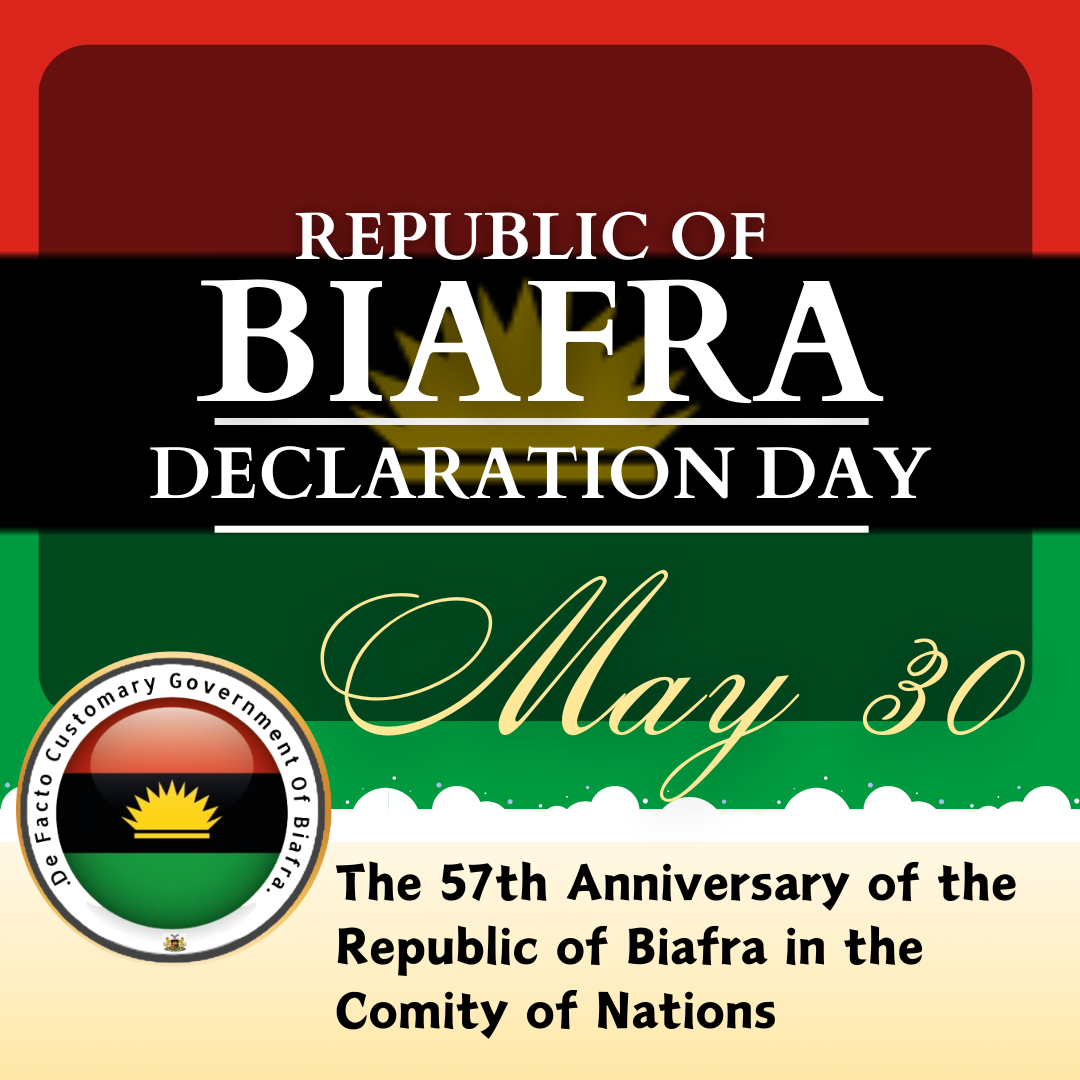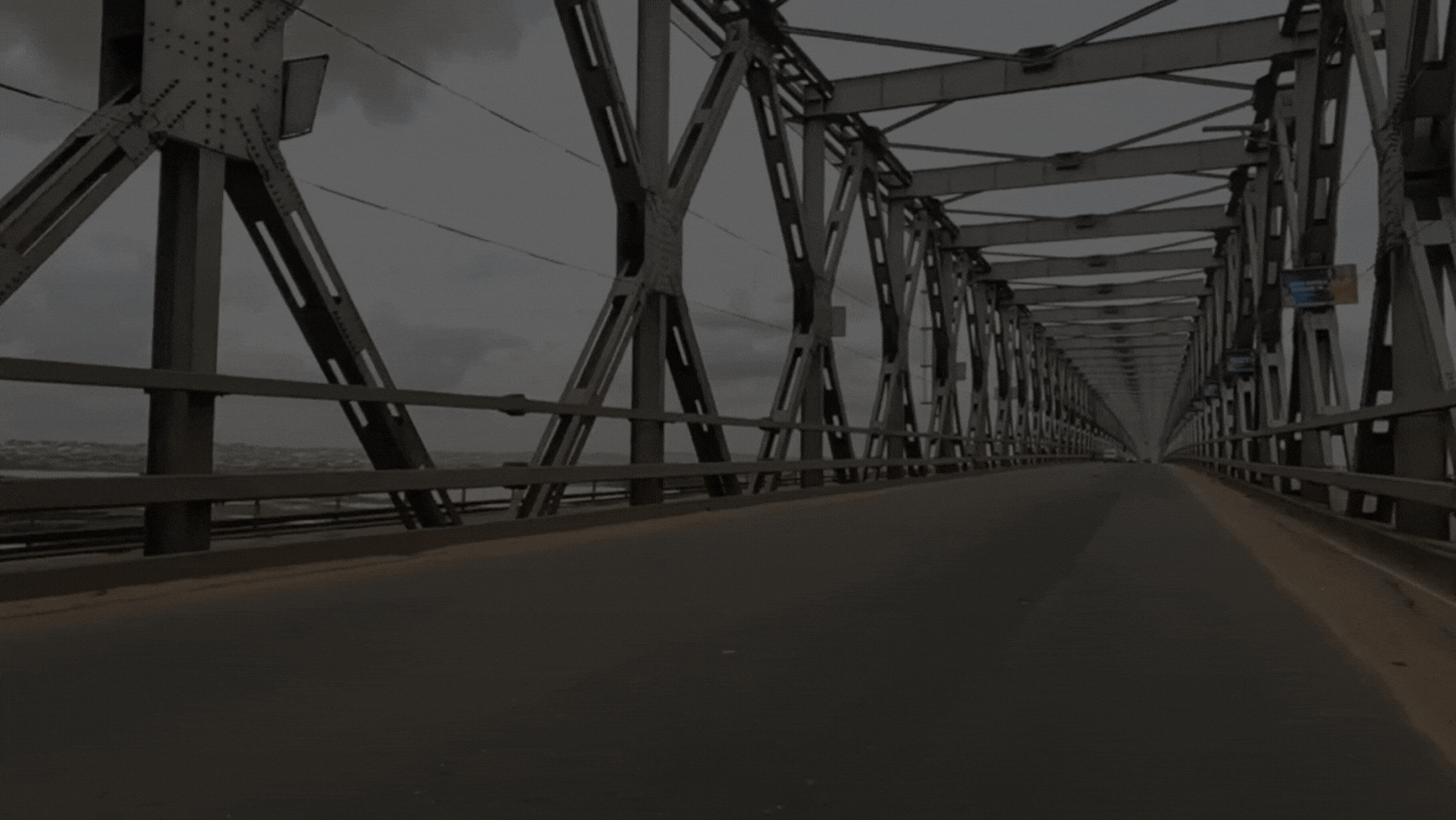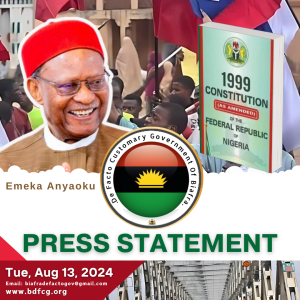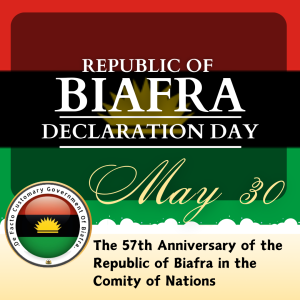
REPUBLIC OF BIAFRA IN THE COMITY OF NATIONS: The 57th Anniversary.
The current status quo of the Republic of Biafra is de facto. The de jure State of Biafra survived for almost three years before being violently repressed by the Nigerian military dictatorship, which was armed by both Britain and the USSR in pursuit of Biafra’s natural resources. Biafran citizens currently face acts of violence and injustice, economic and infrastructural deprivation, and other abuses, including deliberate environmental pollution of Biafran territory by Nigeria.

Legal luminary Jonathan Levy noted grounds for the revival of Biafra, stating: “Biafra was diplomatically recognized by five diverse nations: Tanzania, Zambia, Ivory Coast, Gabon, and Haiti. Others, like The Holy See and some international governmental organizations, maintained informal relations with the Biafran government. Biafra is often compared in legal treatises to the failed state of Katanga, which attempted to devolve from the Belgian Congo in 1960. While the case shares some similarities, there are many differences. The main one being that no sovereign state ever recognized Katanga. Biafra, therefore, is no Katanga and is unique.”
We have proven to be more Nigerian when compared with our neighbors. Biafra stands for peace, unity, and progress. The current self-determination clamors by our neighbors—Oduduwa, Arewa, to name them—were deliberated and upheld by us 57 years ago with great sacrifice. Of course, we are not at the same level, though we wish them well in their own rights. Biafrans must be well prepared to restore their country. Only Biafrans can plan and adopt strategies that will force Nigeria to dialogue through political participation and territorial governance. It is up to Nigeria to decide on her future. Active commitment to due process and the rule of law remain the only valid instruments to express the democratic will of the people of Biafra, and perhaps Nigeria, regarding any negotiation.

It is imperative that we learn from the tragedy of the colonial Nigerian federated union and resolve our differences with the distinctive empathy we had earlier shown to each other before the concocted and false union. Only Biafrans can let the African Union know that we want our country back. Only Biafrans can let the United Nations know that we want our country back. Only Biafrans can let the European Union know that we want our country back. Only Biafrans can let all the people of goodwill in the world know that we want our country back.
It is evident over the years that certain acclaimed leading figures for the Republic of Biafra restoration have emerged. How far they have fared remains questionable regarding the final objective. Historical repression and unshared memories against the people of Biafra have led to mixtures of pride and anger with arrogance, ambition, and courage in our Biafra restoration mission. Though the current Biafran leadership has been linked to educating young and old on the silence and falsity construed to negate freedom and justice to past, present, and future Biafrans, aiming to put them in rot as a people.
It is our duty to continue interrogating certain human absurdities and barbarities that have been happening around us and to communicate them, especially through new social media. There have been inevitable bonds that link communication to the main reason for the survival of Biafrans. This has been made possible by the fact that Biafra’s tragedy was one of the first conflicts that the world watched on television in real-time. The Biafran cause has also attracted great public discourse, including declarations by the government, parliamentary debates, and newspaper editorials. Reviews of relevant official documents in world national archives and reading memoirs of key actors involved in the discussions are ongoing.
In the last 57 years, many intellectuals, both pro and con, have spoken and written various memoirs. Earlier, many had falsified or hidden the ideological reasons behind the Biafran struggle. Most literary works and fiction have highlighted the salient issues, while many others have written from the abundance of their mind and brain. We have delicate works such as those of Chinua Achebe, Wole Soyinka, Ken Saro-Wiwa, Buchi Emecheta, Chinelo Okparanta, and Cyprian Ekwensi. The new generation writer Chimamanda Ngozi Adichie, in her book titled Half of a Yellow Sun, narrated the trauma provoked by the Nigeria-Biafra war and its profound repercussions. Their writings, in one way or another, have been meant for the young and future generations, to stake reasonable claims over their lives and to weigh the actions of dialogue against war.
Biafra has always been disposed to dialogue and negotiation, as she has never in her history invaded or declared war against other people but has never been fearful of legitimately defending her survival. We believe in our capacity to reason, which allows us to act with common sense. The Biafra restoration milestone is open to any questions and discussions.
Prosper Odinga
Spokesperson, BDFCG
Phone: +19173465419
Email: biafradefactogov@gmail.com
Website: www.bdfcg.org




